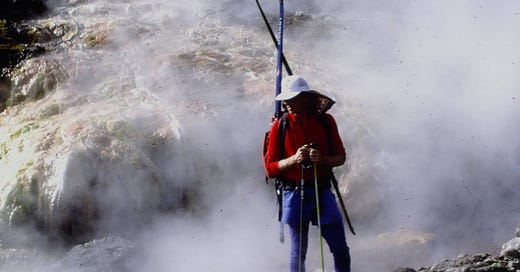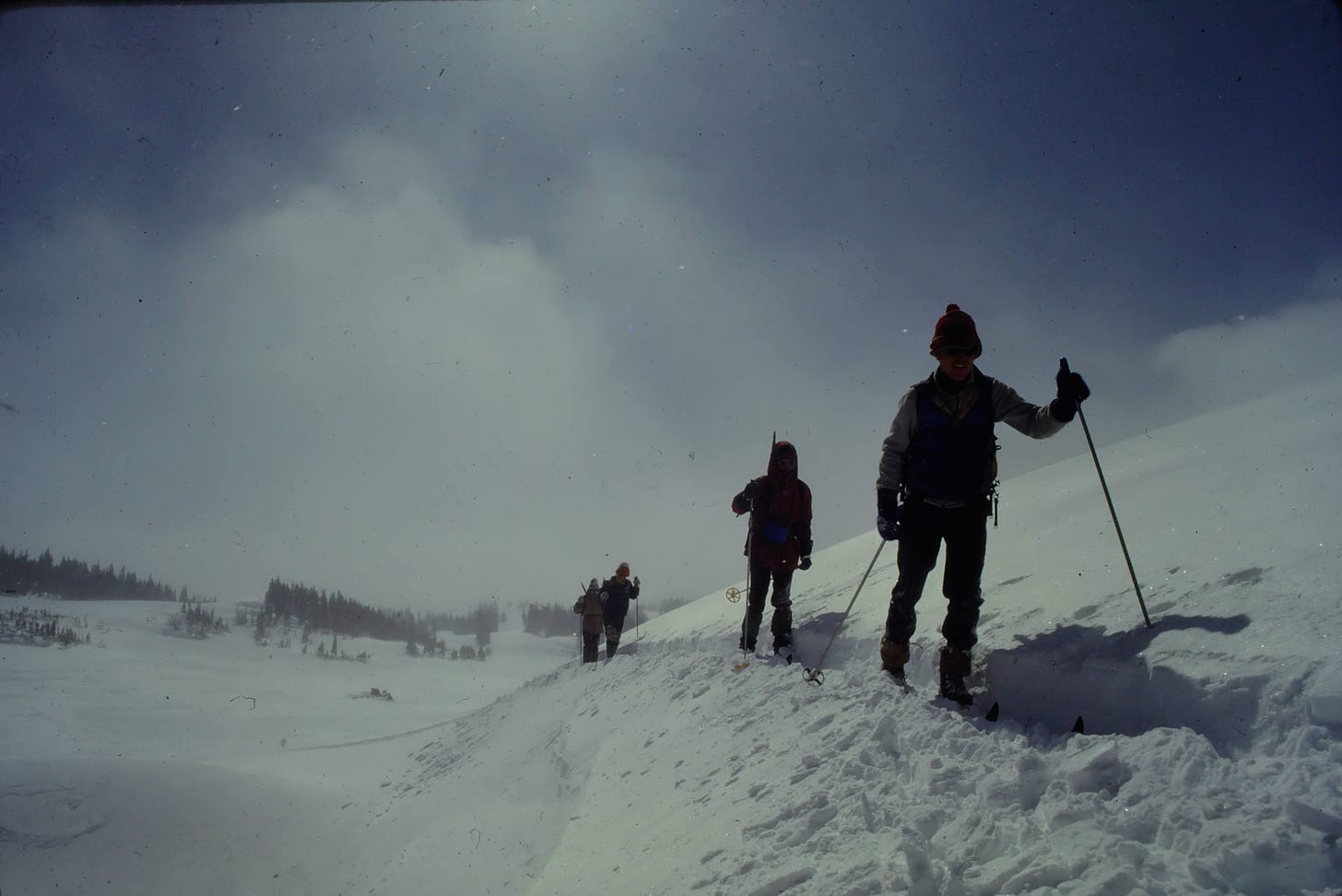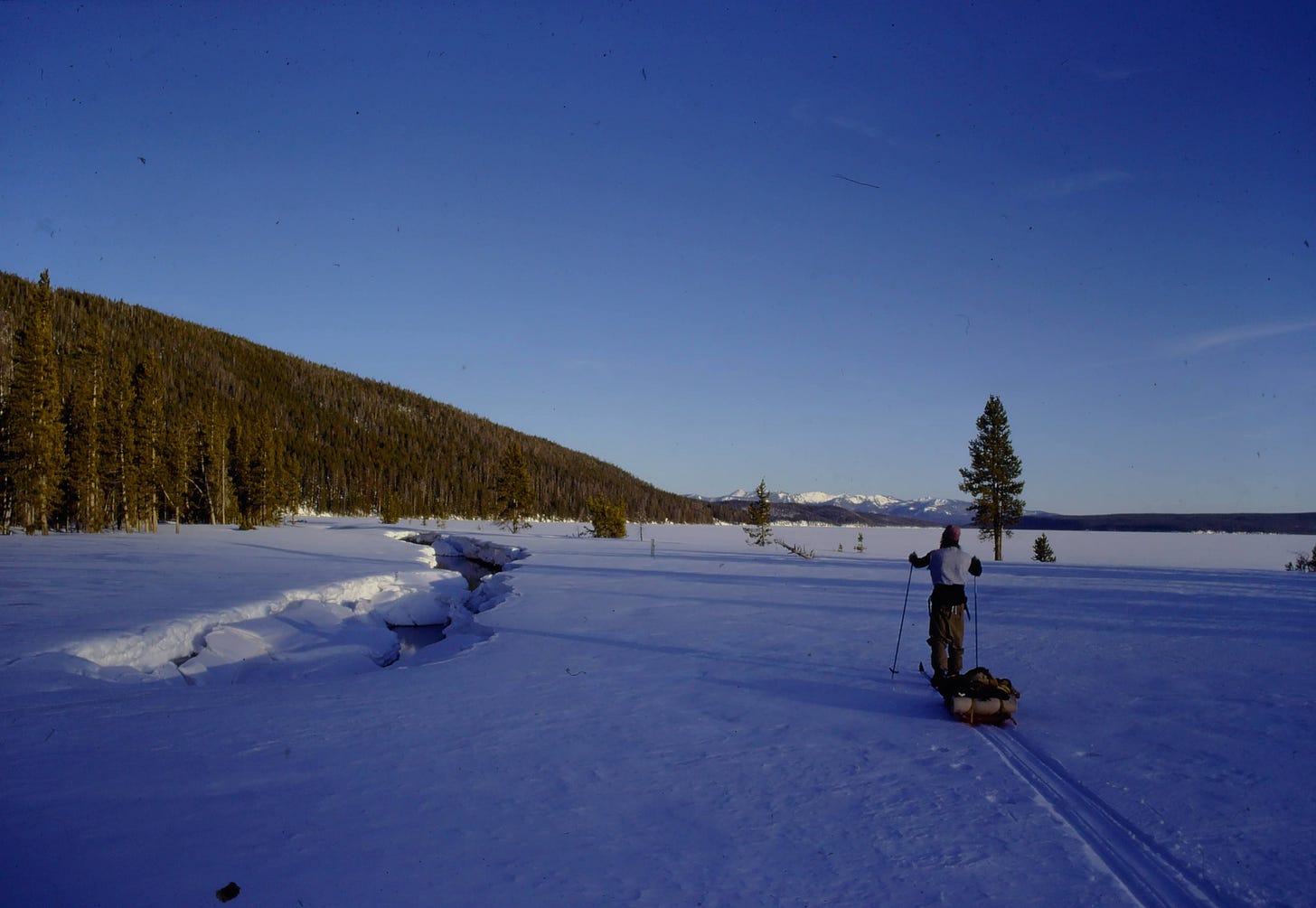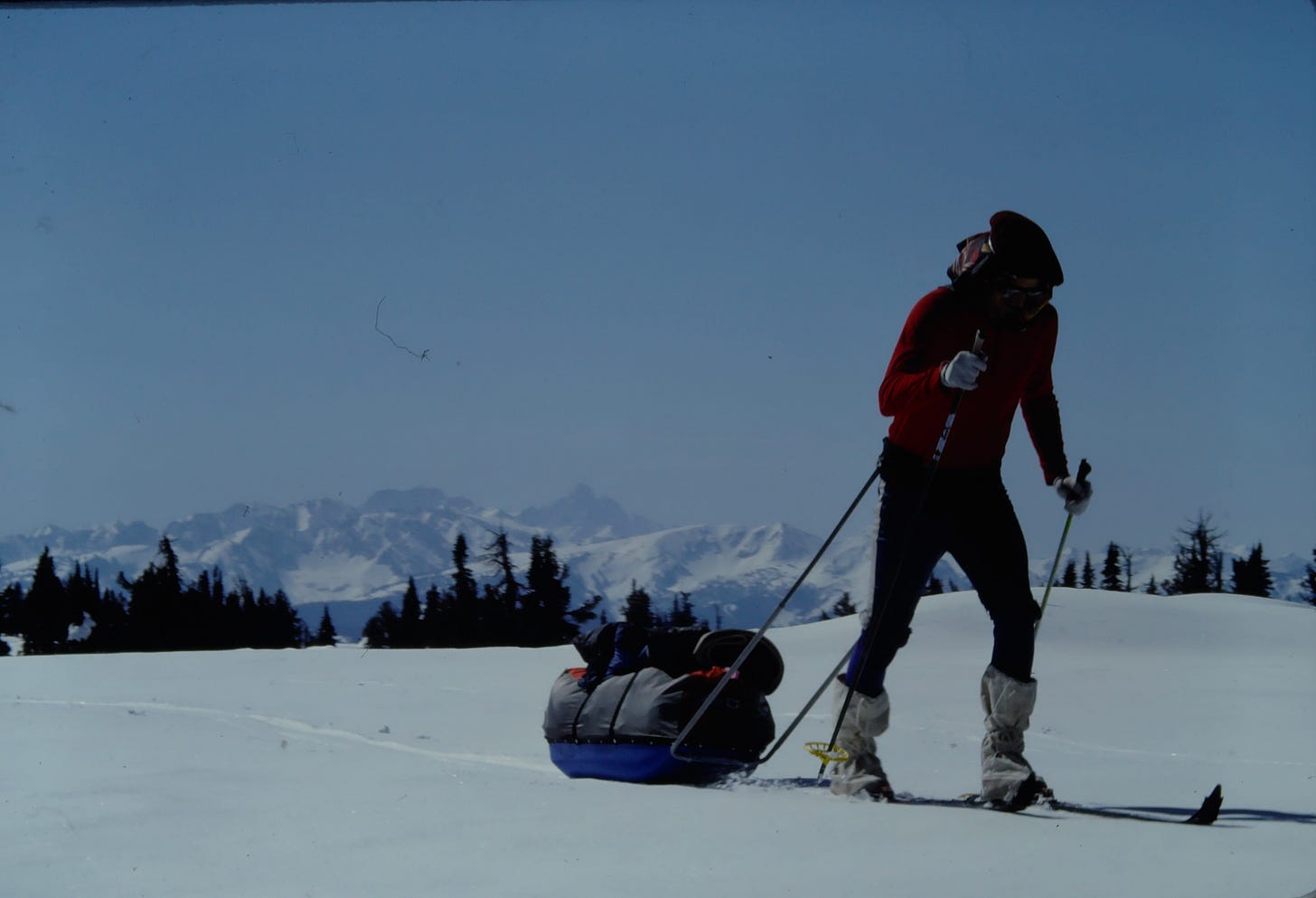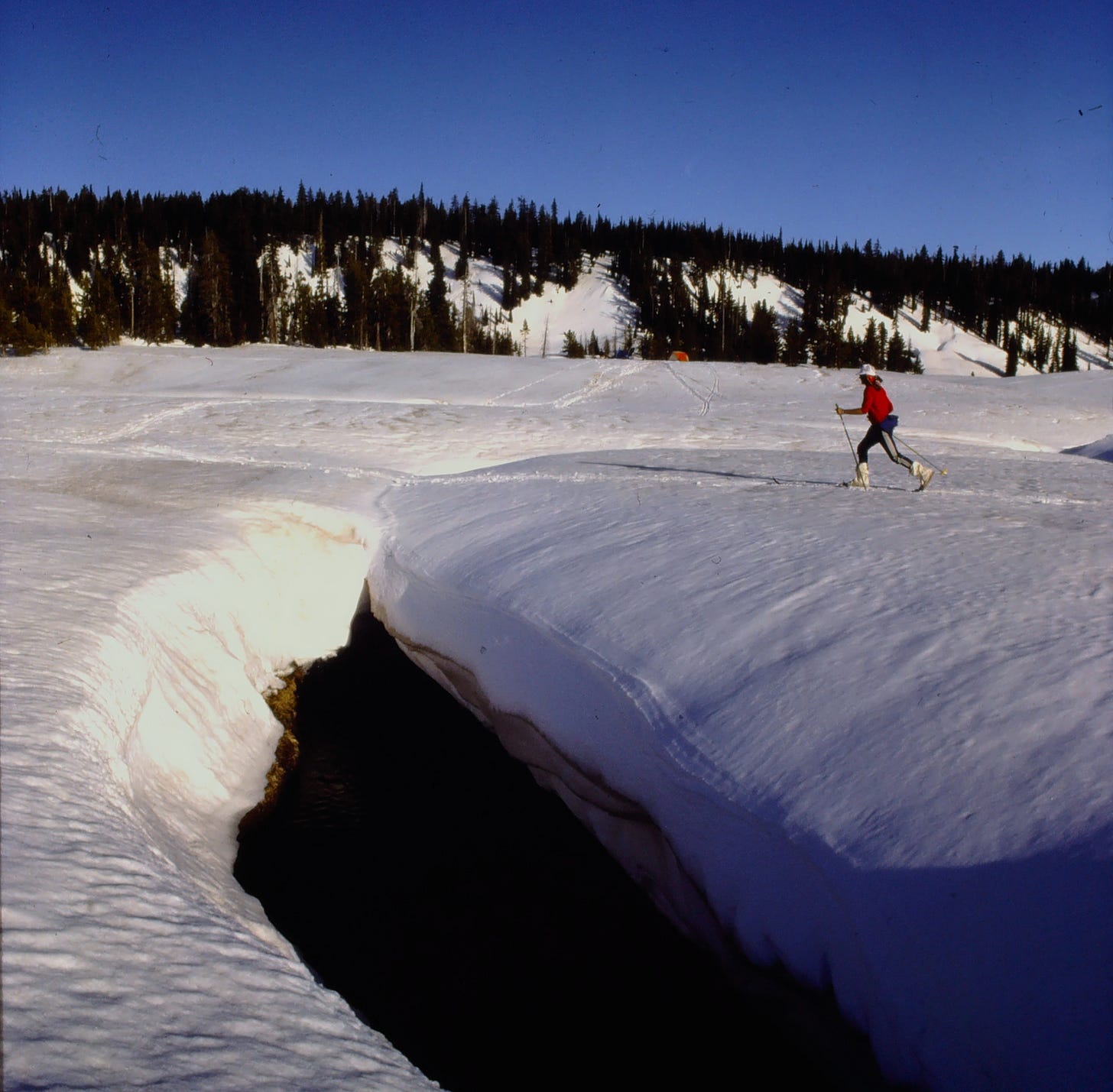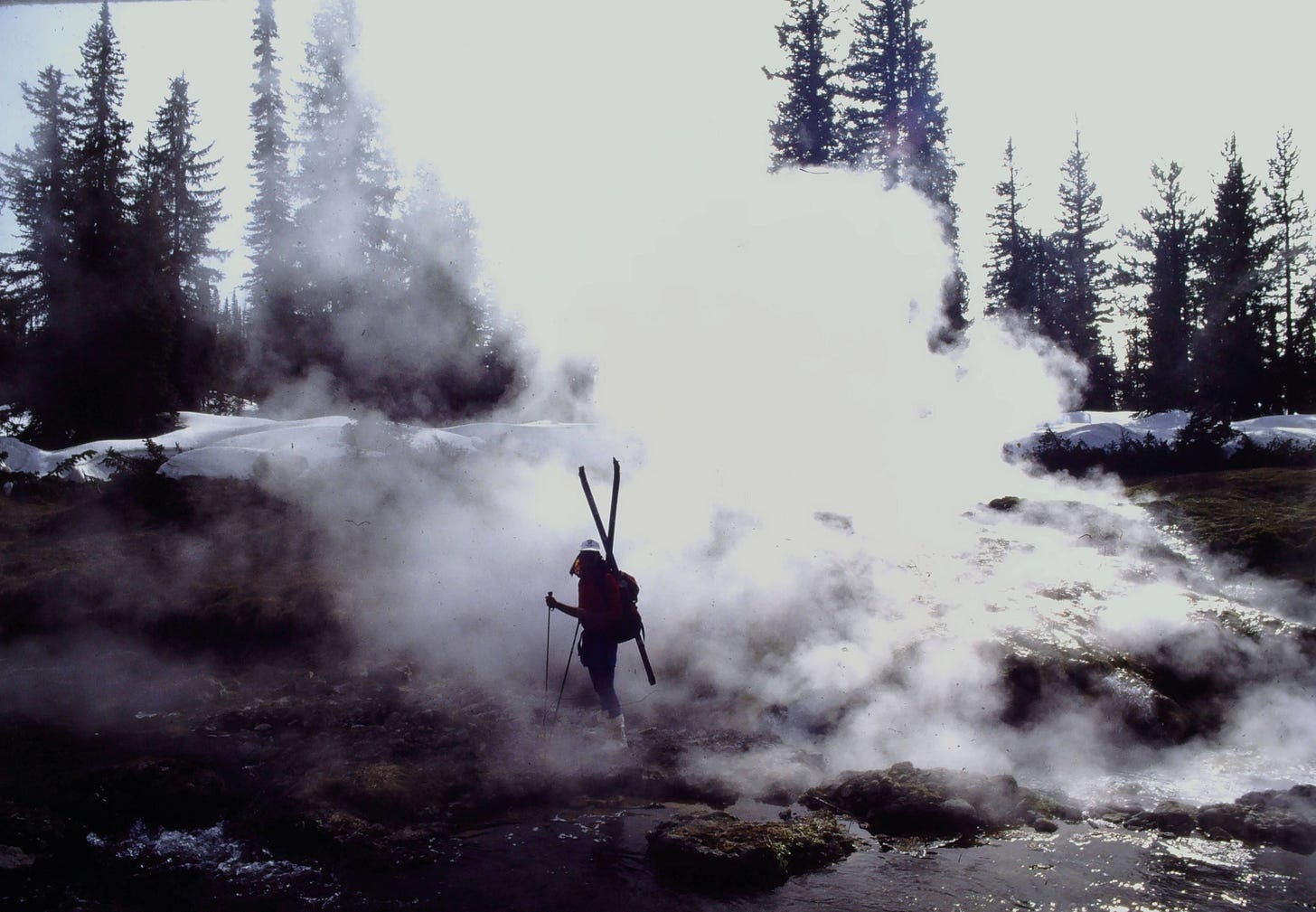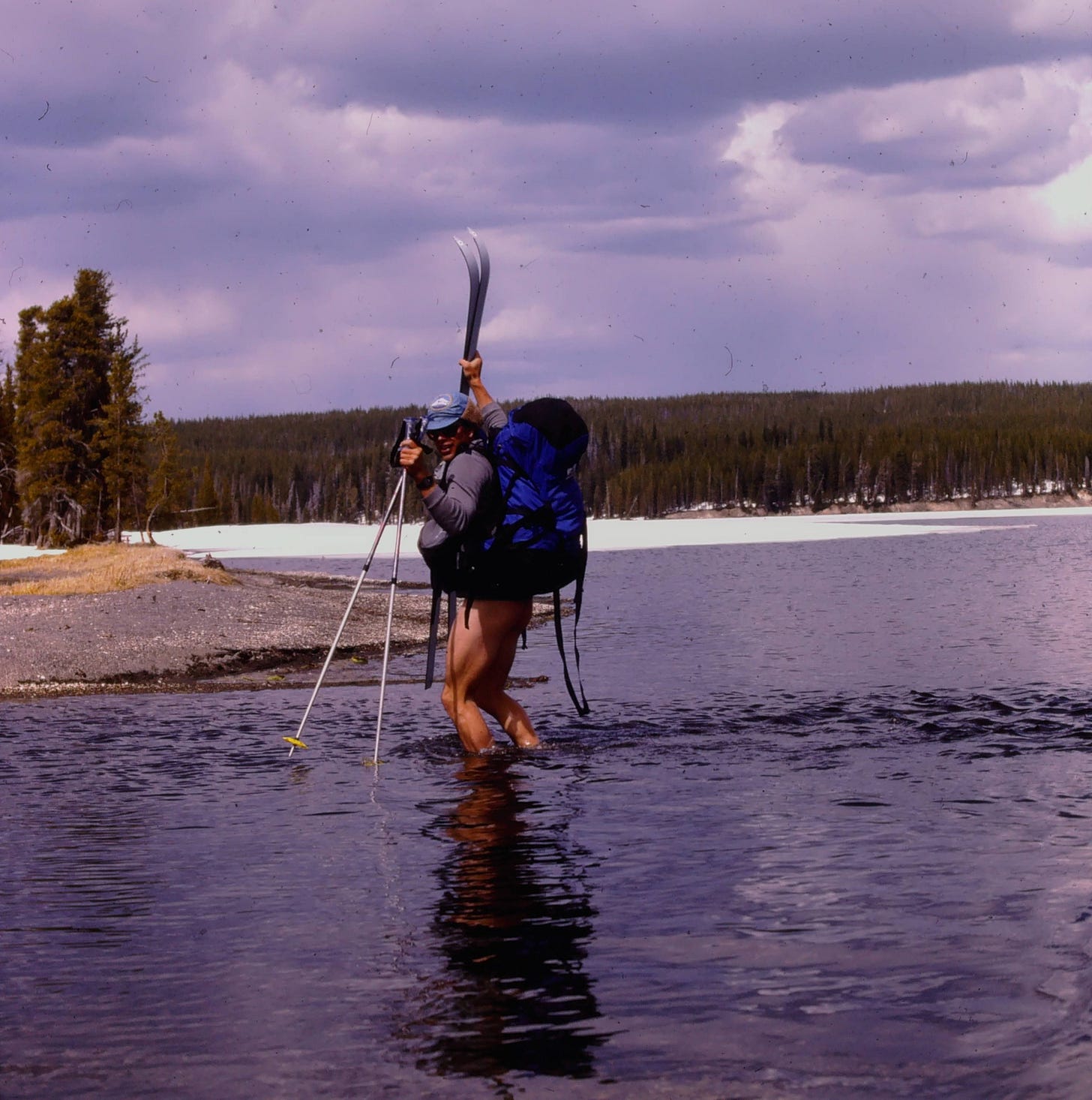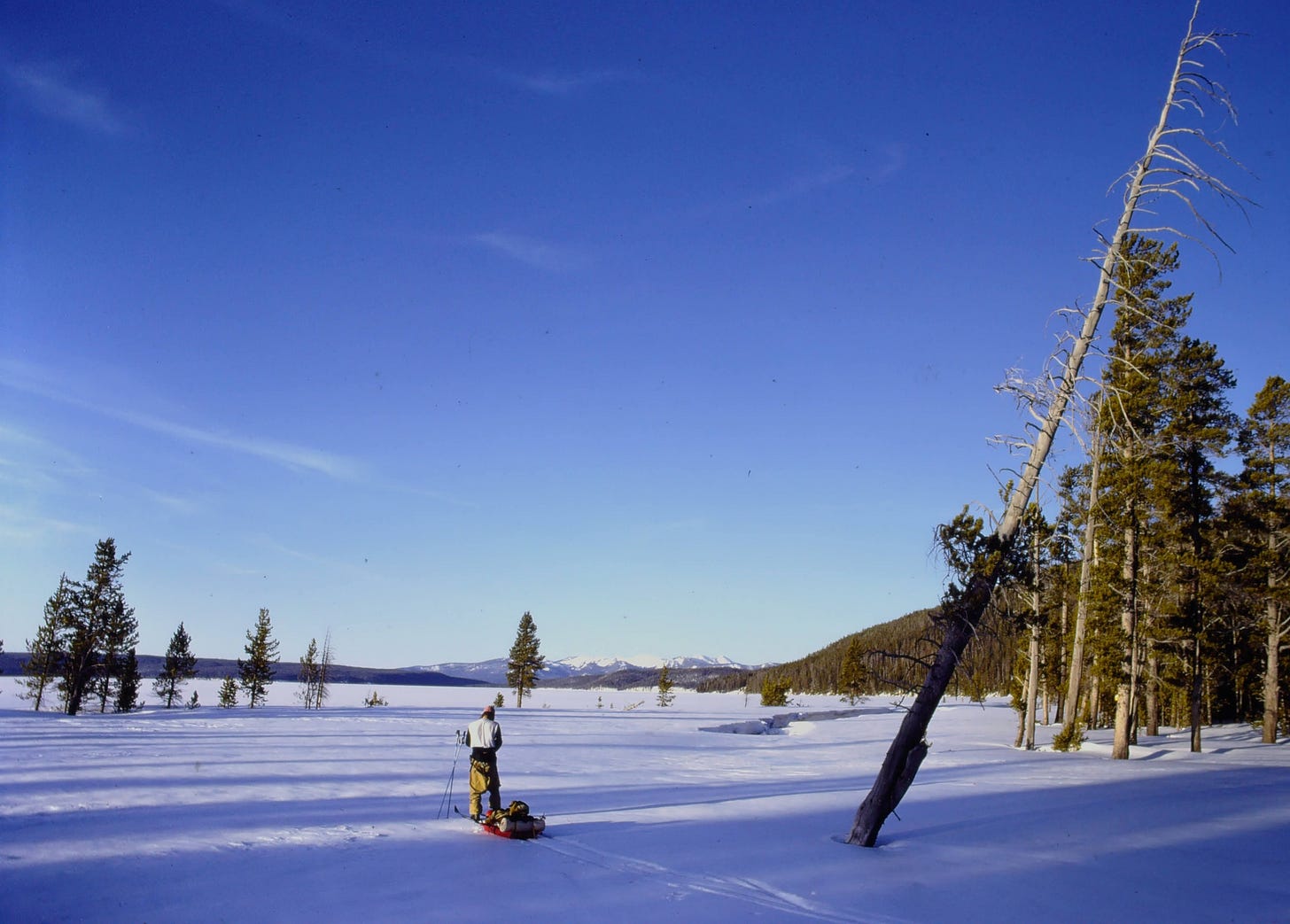Cold, moonless, shadowless like black mud thrown over a snow-covered rock, night came. So we couldn't see them. We didn't even know the coyotes were there until we stopped talking. The stars staggered out and shut us up; a raw wind forced us into the tents, Rick and I in one, Bill and Steve in the other. Each of us wrapped in a down cocoon and waiting silently for warmth. Then they began.
First just a lonesome bark cutting over the snow from one end of the meadow to the other. A sharp bark returned. And again and again, like the cracking of a whip. A pause. Then ripping through the trees came a chorus of howling, yipping, baying, roaring. They were so close. If there had been light, we could have seen them just outside our tents, standing in the snow, singing. Thickly furred chests pushed out, ears flat, eyes half closed, heads arched up and back. The next day we found fur, tracks, scat, and vomit in the snow. We were in Yellowstone.
The four of us had decided to take two weeks and ski out of sight. Go away, get. Just carve off half a month and escape. We had planned a serious ski trek, a baby expedition the length of the park. And then the park, very gently, changed our plans.
On the second night, little bullets of birds were twirling, twittering, hurtling pine to pine in the pink twilight.
"Killdeer," Bill said. This was the kind of thing he knew. "They stay up here all winter." Bill knew practical things–birds, surveying, how to roof a house, rebuild an engine. One year he walked from Mexico to Canada, up through the Rockies.
The third night, after three days of hard skiing, tired and grumpy but finally severed from the other world, we stopped above the massive white oxbows of Gregg Fork. We talked about the epic ahead of us: whole mountain ranges to cross, miles and miles to traverse wearing skins and pulling sleds.
Rick looked down on a purple light cutting into the dunes of snow and said: "Why?" So we dropped that idea.
Rick liked to ask that kind of question, anything without an easy answer. Not that he hadn't had his share of epics: sailing single-handed across the South China Sea, bicycling over the Himalayas. He was an architect; he restored old homes in an idiosyncratic way.
I think Steve was prepared for an epic. He was that kind of guy, a planner, meticulous, chemist by degree and computer scientist by trade. He could recite Robert Service's poems flawlessly. Steve was also a marksman; he shot 30 hours a week hoping to make the Olympic team.
Steve and I had planned this thing together in his kitchen. We laid a huge map of Yellowstone on the linoleum floor and crawled all over it, plotting, debating. It's easy and expected to plan an epic. The big psych is status quo-part of the adventure ideology. The comfortable life can make you long for misery. So you search for a real struggle. But apostasy is something you learn from the outdoors. Yellowstone is a place that makes you rejoice in it. We set up a base camp on a deep slab of snow on the bend of an oxbow.
The next morning, light and free as killdeer, skinless, sledless, almost weightless, we skied south. It was a recon. We were bound for a place found only in Yellowstone.
We descended Gregg Fork single-file. Most of the stream was buried under snow as hard and cold as a layer of marble. Sliding directly on top, slipping delicately around open holes, we turned when the creek did. It got steep, we thought steep. It relaxed, we relaxed. Sans trails, signs, or signals, we let geography set the pace.
Halfway down the fork we stopped beside a huge spruce. In the snow beneath it were needles, shreds of bark, tracks–deer had bedded down here. The tree was on the edge of the stream beside a deep melt-well. Tracks led over to the hole. We skied to the edge. Ten feet down, sprawled out in rushing water, was a dead deer. It apparently had attempted to negotiate the sheer snow walls for a drink, slipped, and broken its neck.
Laced in by walls and streets and noise it's easy to forget how quick and easy and close death is. It's accepted to think of nature, the nature out there somewhere, as benevolent, merciful, harmonious. Mother Nature. Then you see this dead deer in the creek and wonder how long it took to die.
An hour later we skated off snow and lurched to a stop in a green meadow. Columns of steam lazily rose into a blue sky. Summer. Summer was here inside winter. This was what we were searching for, the Ferris thermal area. Something warm and soft inside a cold white shell–the hot pulse of earth piercing the surface.
We shrugged off our packs, unsnapped our skis, stripped, and wandered into an odd little world; four men naked as every other creature, drawn to warmth like every other creature. Mounds of yellow mud burped steam. Scalding blue rivulets spread like veins across the meadow. Whole glassy pools, green-rimmed and blue inside, periodically belched stench. This was the mouth of Mother Nature-coughing, breathing, seething in the middle of thousands of miles of snow.
After a lengthy search, we found a spot where a few misguided hot springs rose in the middle of a frozen stream. We stepped in, sat down, grinned. This was why we came.
The next day Bill chose to lounge. "Hey, I'm on vacation," he insisted (we had decided it was OK to say that), so Rick, Steve, and I skied back down without him. This time we found Ragged Falls, a warm waterfall 50 feet high, created from a river 50 feet wide. It was absurd: massive white drifts sloping into a three-foot strip of lush green grass bordering a huge, hot, steaming river. We spent two hours cavorting like ten-year-olds, floating, bobbing, sputtering, clambering naked up and down through the falls.
After that day we had no doubts. The epic was out. Surprising what kind of freedom this gives you. We decided to relocate basecamp to the Shoshone Geyser Basin.
It took one day. En route we crossed four sets of fresh bear tracks: one left by a lone grizzly, two presumably set by a grizzly sow and her cub, and one belonging to a black bear. We crossed deer tracks, elk tracks, and moose tracks. In one valley a woodpecker head-hammered high in a dead pine. Camp robbers, gray and greedy, kept watch of our progress bounding limb to limb. Huge blue sandhill cranes, like kites playing tag, scythed just above the trees.
The Shoshone Geyser Basin is one of the largest thermal areas on the face of the earth. The last time I skied across Yellowstone, I was on an epic-making excursion, so I skipped it. Steve, Bill, Rick, and I spent half a week there, doing thorough, spirograph-like recons of the entire basin.
One day, after fording several swamps and inlets, Rick, Steve, and I found ourselves standing on a reed-covered spit separated from shore by a 60-foot expanse of open water. By now we had the routine down. Strip to absolutely nothing. Stuff everything in your pack but skis and poles. Make two trips.
Shivering, I balanced my pack on my head and waded out. Warm water rose over my calves, then up over my knees. Then up around my waist, then to my chest. Stepping delicately, I had moved more than halfway across when... the water suddenly swallowed me. Before I could even yelp I went under, black liquid closing over my head, leaving the pack floating alone on the water. Adrenaline and fear shot me back to the surface. Stroking, retreating, dragging the pack through the water, I splashed back to shore. That's the kind of thing you can do in Yellowstone and not have an ordeal. So that's what we did, for three days. We played.
Our two weeks were almost gone when we decided to ski across Shoshone Lake. Knowing it was two feet deep in slush during the day, we waited until midnight, pulled up camp, and gingerly skied out onto the ice.
Invisible specks of snow pattered our faces on a night like the first. Cold, moonless, shadowless. Wet clouds had sucked down over the lake. But four hours of darkness had not been enough to change the enormous bowl of mush back into ice. Sometimes our skis held. Sometimes we would hear a sick snap that would send goosebumps down our necks. Then we would drop to our calves or deeper in jagged icecubes and frozen slush, let out little screams, and crash forward until we regained solid ice. Kind of horrifying at first, but we got used to it.
Serious fractures, those that penetrated into open water, we crossed at right angles. Switching leads, each man got his own chance to go for a swim. But by 5 A.M. we'd traversed Shoshone Lake without mishap. We bivied beside Lewis River for two hours.
It was snowing when we got up. Bill wore his usual massive grin. It was his birthday.
"Ya know, felt like I was on the pointy end of the rope the whole damn night." He was saying it like he always did, at once serious and comical.
I started to chuckle. Steve broke a crooked smile. Rick let out a great laugh that rebounded off the valley walls.
That night had been the most epiclike of the whole tour, and it had been nothing, a cake walk. And we'd still had a great time.
Thing is, epics aren't all they're cracked up to be. Sometimes they're plain narcissistic. When you get frostbite or dysentery or face death, you become the center of your own universe. Your own struggle comes whistling so loud in your ear that you can't hear the earth, can't stop and listen to the landscape. Yellowstone, given the chance, won't let you get away with that.
+++
Published in the December 1988 issue of Outside

